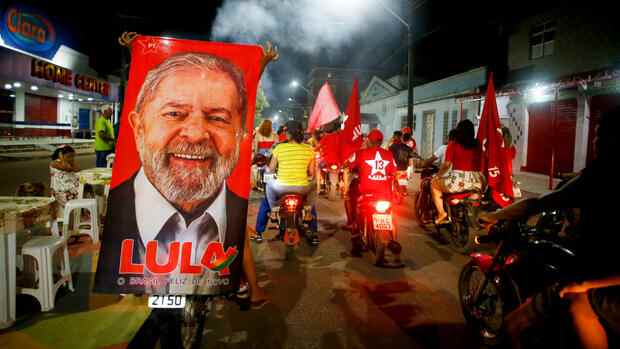Brussels Luiz Inácio Lula da Silva’s victory in Brazil’s presidential election could revive the stalled trade deal between the EU and South American trading bloc Mercosur. Leading European politicians expressed hope on Monday that the vote out of incumbent Jair Bolsonaro would give new impetus to the negotiations.
The chairman of the trade committee in the European Parliament, Bernd Lange (SPD), told the Handelsblatt: “I assume that a new dynamic will emerge. With Bolsonaro, the main obstacle is gone.
Manfred Weber, party and group leader of the European Conservatives (EPP), also called for a new attempt. “In order to reduce dependency on China and other autocratic systems, we Europeans need the power to conclude new trade agreements with democracies and the free world,” he said. “South America is key here. Mercosur is the symbol for the economic future of Europe.” If the EU does not ratify the agreement now, Europe as an export continent “would not have a good economic future”.
The EU finally signed the trade agreement with the four Mercosur countries Brazil, Argentina, Uruguay and Paraguay in 2019 after 20 long years of negotiations. It is the largest free trade agreement that the EU has ever agreed. Every year, tariffs amounting to several billion euros are to be eliminated.
Top jobs of the day
Find the best jobs now and
be notified by email.
The problem: the agreement has been on hold since the political agreement was reached. Several national parliaments in the EU and the European Parliament have so far refused to ratify the treaty. They have concerns about unchecked deforestation in the Amazon rainforest and workers’ rights in Brazil.
>> Read here: Lula wins runoff in Brazil and becomes president for a third time.
Deforestation accelerated dramatically under right-wing populist Bolsonaro, who abolished numerous environmental laws and controls. As long as he was in office, ratification of the trade agreement was therefore considered unthinkable.
The new president wants to prevent the deforestation of the rainforest.
(Photo: Reuters)
Lula, on the other hand, has signaled an about-face on environmental issues. “Brazil is ready to resume leadership in the fight against climate change,” the newly elected president tweeted after his victory. He will work for “zero deforestation”.
The hopes in Europe are correspondingly high. We are ready to talk to the new Brazilian government about the Mercosur trade agreement, said EU Commission Vice President Valdis Dombrovskis on Monday at a meeting of EU trade ministers in Prague. “We remain committed to the agreement.”
Swedish Trade Minister John Forsell also spoke of “new opportunities”. Free trade agreements are one of the priorities of Sweden’s EU presidency next year, he said.
The economist Gabriel Felbermayr, head of the Austrian Institute for Economic Research (WIFO), demanded on Twitter that the EU must now do everything it can to support Lula and advance the negotiated free trade agreement. In addition to the reduction in customs duties, important advantages are above all legal certainty and the reduction in bureaucracy.
Lula is also under pressure from the powerful agribusiness lobby
However, the negotiations will not be easy. Although Lula’s victory solves the blockade, said the chairwoman of the internal market committee in the European Parliament, Anna Cavazzini (Greens). It’s now easier to start new conversations. But the agreement will “not be a sure-fire success” because Lula is also under pressure from the powerful agribusiness lobby in Brazil.
First of all, the new president must bring the forest protection policy in his own country into balance, said the Green politician. He must restore environmental legislation and adequately fund the agencies that his predecessor had eroded. “That is priority number one before talking about trade deals now. The EU really needs to put pressure on that.” Cavazzini warns that as long as the rainforest is not protected, trade liberalization would exacerbate deforestation.
The deselection of the previous President J. Bolsonaro should open the door for trade relations with the EU again.
(Photo: DADO GALDIERI/The New York Times)
Lula has already announced that he wants to renegotiate other points in the agreement. He fears that Brazilian companies will not be able to compete with European companies and wants appropriate safeguard clauses. Argentina also has its own ideas. The government in Buenos Aires recently introduced new export taxes to plug the gaps in the national budget. These would not be compatible with the trade agreement.
>> Read here: Brazil’s new president must reconcile a divided country
MEP Lange said Argentina might be allowed some “flexibility”. But Brazil remains decisive. In the first preliminary talks, Lula’s party colleagues had basically signaled a willingness to reach an agreement, said Lange.
But in the end, trade talks always depend on the details. And the negotiators also have to overcome reservations in France: the strong French farmer lobby fears competition from South America.
Cavazzini expects a heated argument about the additional declaration. “There will be tough political arguments about how the agreement will be changed and whether that is sufficient,” she said. “If it were just an interpretative additional explanation, I wouldn’t find that sufficient. It must be legally binding.”
More: After Ceta also Mercosur? Brussels and Berlin are speeding up trade agreements

